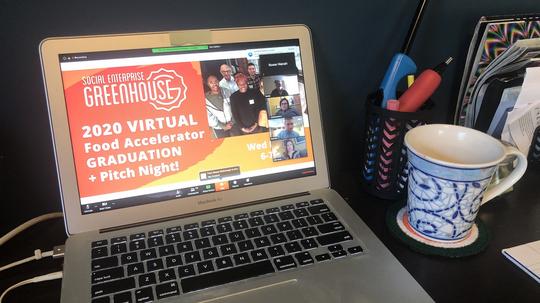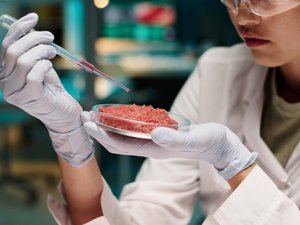
When Social Enterprise Greenhouse (SEG) welcomed the 2020 cohort of its food accelerator, the world was a different place.
The coronavirus had not yet taken hold of Rhode Island. No stay-at-home orders were in effect. SEG itself was still operating as normal, allowing people into its coworking space and running its accelerator programming in person.
Things changed, and SEG adapted with it. Last week, the program held its first-ever virtual pitch night. Five of the original 11 startups' founders presented their business ideas over Zoom—ideas they'd been honing for the last three months with the help of SEG's full curriculum, advising, peer learning and access to a network of experts in the food industry.
"Our secret sauce is really our community," SEG CEO Kelly Ramirez said before the founders pitched. "People follow their true north. It's all about passion. It's all about social change and working together to make that change. The SEG community is really special. It really does take an ecosystem."
First to pitch was Michelle Robinson, the founder of Eden's Bowls. The startup will develop and sell plant-based, allergen-friendly meals and food products to people on the go.
As it happens, Robinson's vision may work well in the coronavirus world: "Imagine that with the push of a self-sanitizing button, out pops a bowl of steamy, creamy, dreamy macaroni and cheese," she said during her pitch. Robinson plans to sell her bowls to restaurants and convenience stores like Cumberland Farms.
Another startup pitching that night, FreshConn, might also find an especially large market opportunity due to Covid-19. The startup aims to deliver food directly from farmers to people in food deserts. The business model: Customers pay a delivery fee, and farmers pay a transaction fee.
"FreshConn simplifies and streamlines the entire process," said FreshConn co-founder Brandon Monti.
Food delivery startups elsewhere in Rhode Island, including Feast & Fettle and WhatsGood, have seen significant boosts in sales over the last two months. FreshConn may be poised to follow in their footsteps.
Three other startup founders had a chance to pitch to the Zoom audience: Jasmine Yang of Lila, which aims to introduce Chinese superfoods to the American market; Steward Martin of Providence Gardenworks, an urban composting startup; and Tarshire Battle of Roots to Empower (rebranded from Restoration Coop), an entrepreneurial training program for formerly incarcerated African-American men in Rhode Island.
Although they've now officially graduated from the accelerator, all of these startups will continue to have access to SEG's resources for the foreseeable future. As SEG COO Matt Ramirez put it, "There is no exit from SEG."
"Your work and ideas are more important now than ever," he told the founders. "One of the best indicators of success is resiliency. ... You have found a way to continue with your ideas, to continue with your ventures, to finish this accelerator and demonstrate an immense amount of resiliency and commitment."








